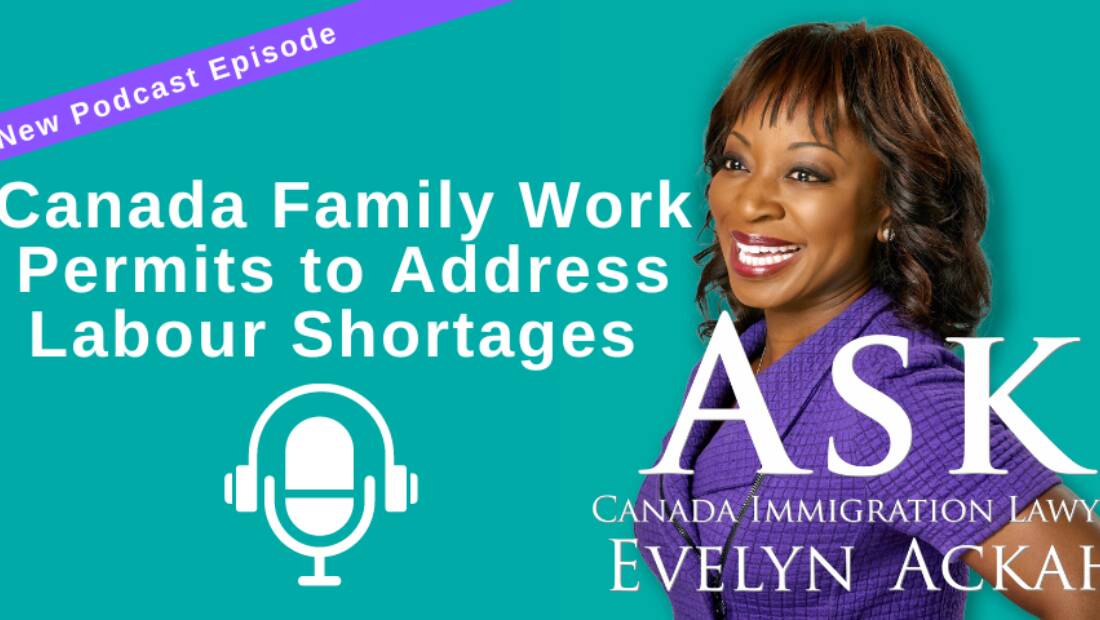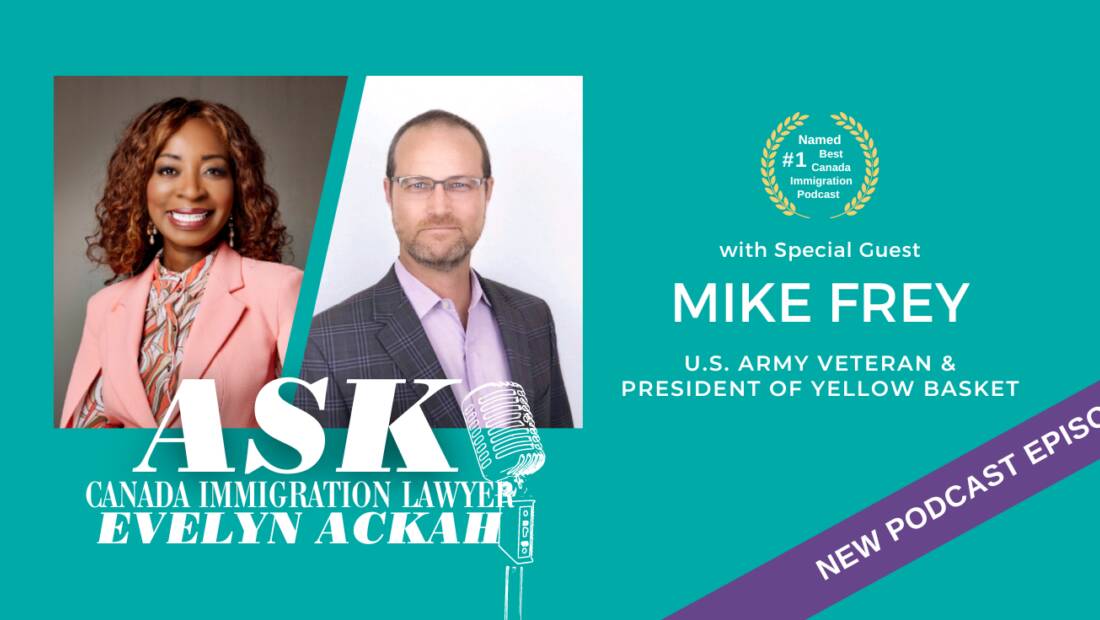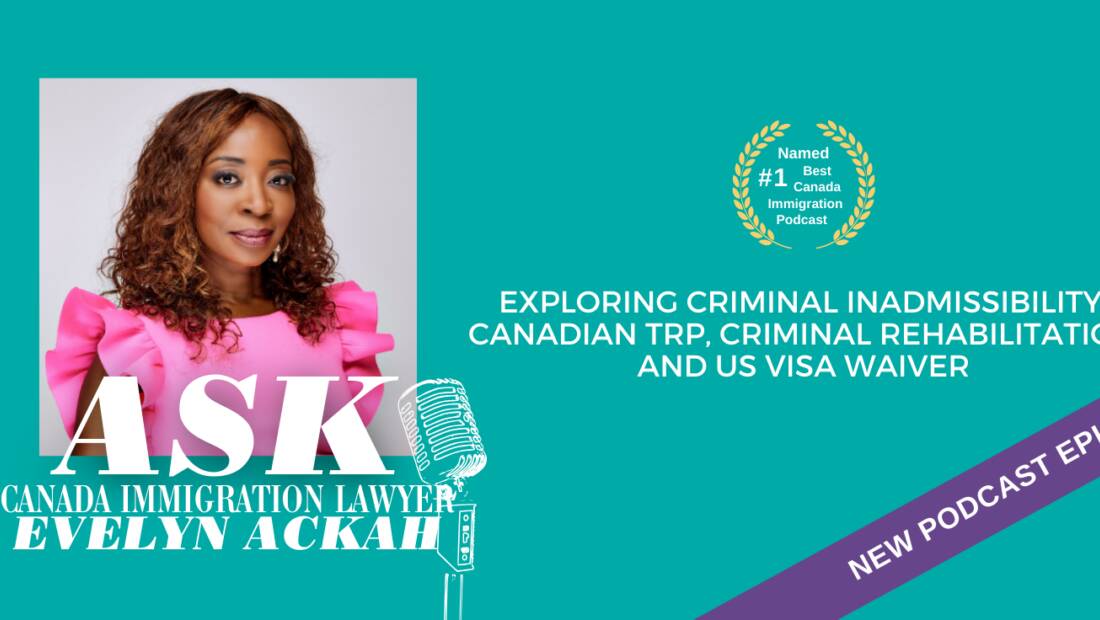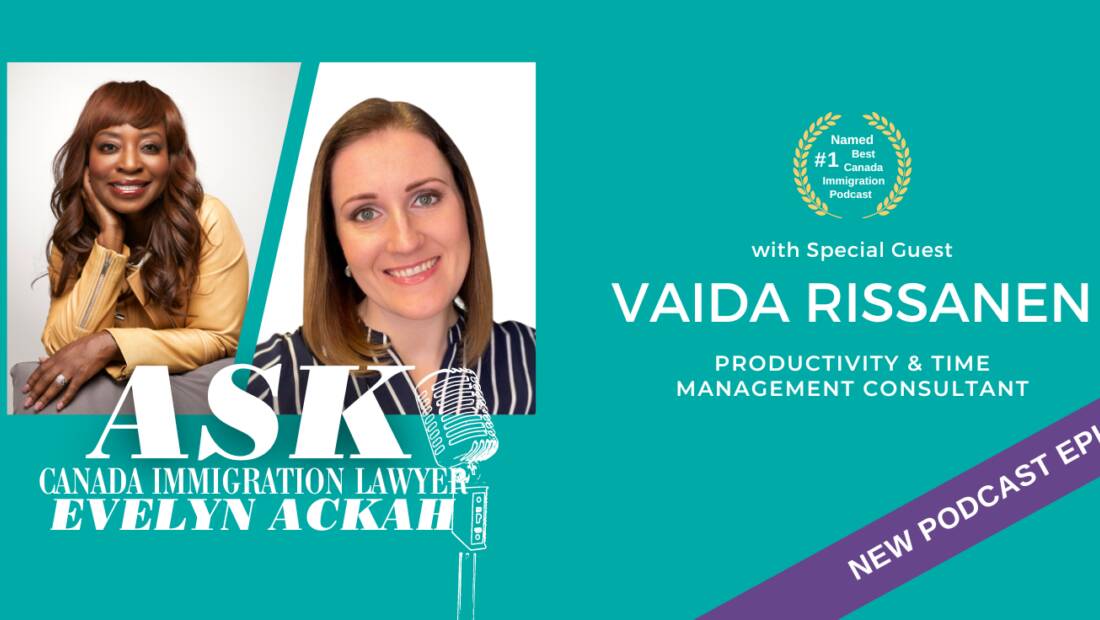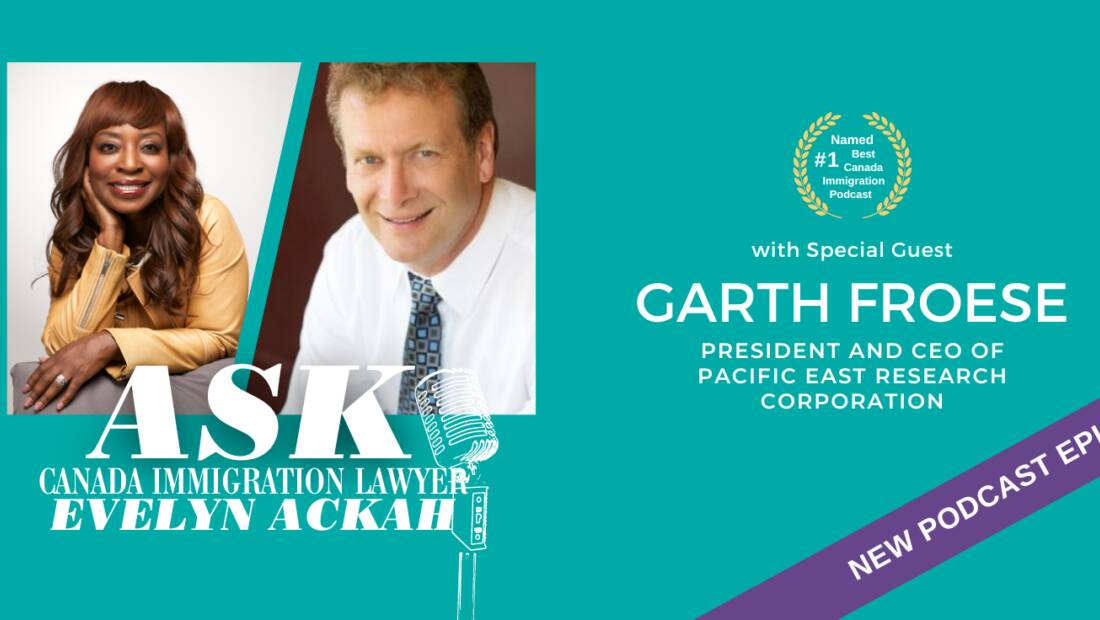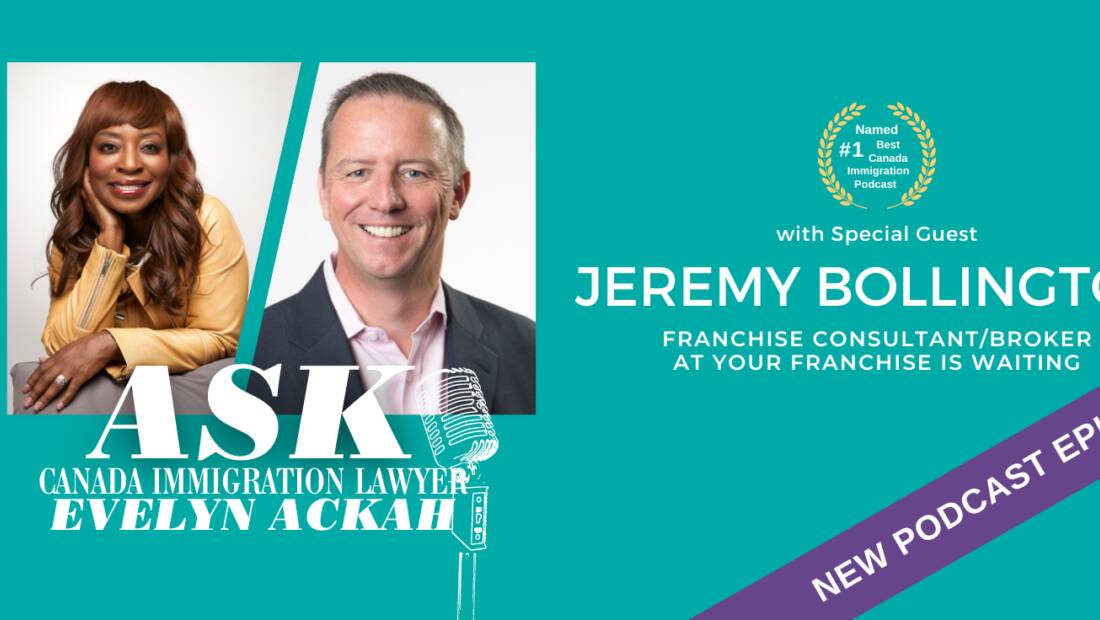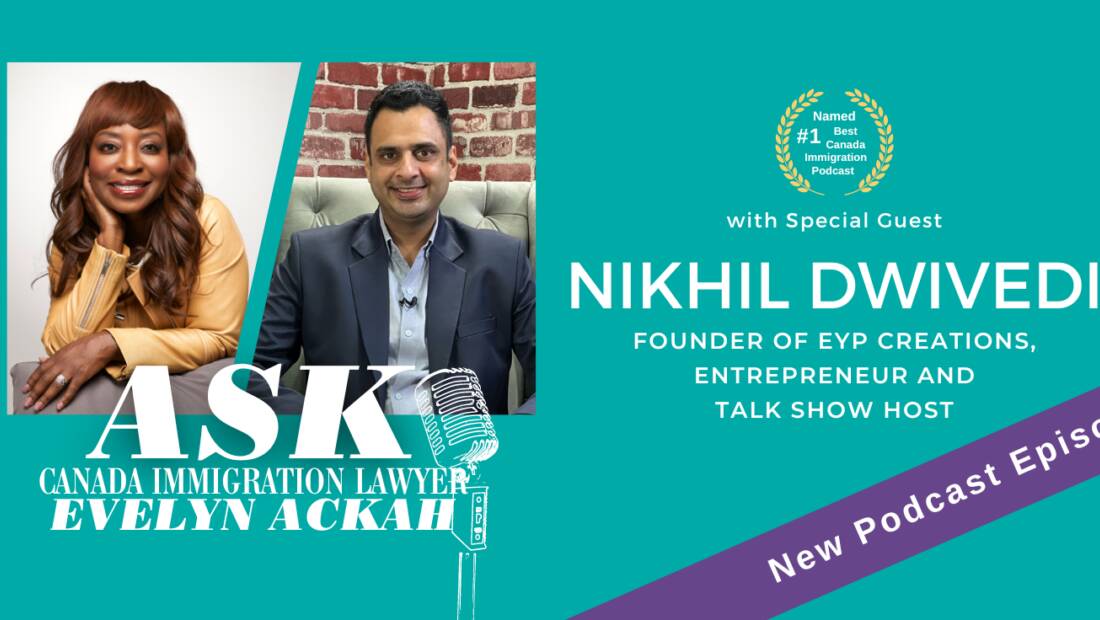Or listen on your favourite podcast app
BOOK YOUR FREE CASE EVALUATION
Calgary immigration lawyer Evelyn Ackah discusses Canada's newly announced family work permits to address the ongoing labour shortages, and how employers and temporary workers will benefit. Canadians are not returning to the labour market as quickly as employers would've liked post-Covid.
- Starting January 2023, for a 2-year period Canada will extend work permit eligibility to spouses, common-law partners and working-age dependents of temporary workers of all skill levels.
- Phase I of the new family work permit pilot program will enable family members of workers coming to Canada through the high-wage stream of the Temporary Foreign Worker Program or the International Mobility Program to apply for an open work permit.
- Phase II will expand the measure to family members of workers from the low-wage stream of the Temporary Foreign Worker Program.
- Phase III of this program will include consultation with agricultural partners and stakeholders to assess the feasibility for expanding the measure to family members of those in the Agricultural Worker stream.
- Currently, only spouses are eligible for a work permit if the temporary worker is in an occupation the government considers high-skilled.
- Canada hopes over 200,000 family members of foreign workers will be able to work in Canada and help end the labour shortages.

About Evelyn Ackah
Evelyn Ackah is the Founder and Managing Lawyer at Ackah Business Immigration Law. We work with individuals and business owners from all over the world who want to cross borders seamlessly. For more information on immigration to Canada or the United States, Ask Evelyn Ackah at Ackah Business Immigration Law today at (403) 452‑9515 or email Evelyn directly at contact@ackahlaw.com.
The Ask Canada Immigration Lawyer Evelyn Ackah podcast by Calgary Immigration Lawyer Evelyn Ackah was named #1 Best Canada Immigration Podcast in 2022 by Feedspot.
BOOK YOUR FREE CASE EVALUATION
Transcript:
Evelyn Ackah:
Good day. Thank you so much for joining Ask Canada Immigration Lawyer Evelyn Ackah on the podcast today and on our LinkedIn Live across all platforms. I'm really excited today to be with you to talk about employers and temporary foreign workers, and some of the changes that the government has recently made. We're all hearing as employers and just anybody who listens to the news how difficult it is currently to find great workers that are able to stay and be full-time. Canadians are not returning to the labour market as quickly as employers would've liked post-Covid. And so we're looking more and more at immigration to provide the opportunities for skilled workers to move to Canada to help fill that immense lag and the vacuum that's been created of skilled workers. So I'm really thrilled for you to join me today to talk about the latest measure that the Canadian Government has made, which is to announce that they are going to do a two-year pilot program that's going to allow for more foreign workers to work in Canada.
So currently, one thing that's great about Canadian immigration is when you move to Canada and you are a foreign worker in a high skilled category, your spouse most of the time is eligible to obtain as well an open spousal work permit, so long as you're in the skilled worker category, the high skilled stream. But this did not qualify or apply to those people who were lower wage, or technical, or trades, or agriculture. But now the government has launched a new pilot. It's going to be for two years starting in January, because their focus is why not keep the people that are already here working and help them bring their spouses who can also work? So the government has announced this will start in January 2023. It'll be a temporary two-year program. And they will expand the eligibility to work in Canada to spouses as well as working-age children, which is incredible, because many years I've been doing this, the 22 years, children have never been able to work.
So a lot of times people bring their children and they say, can't they get a summer job? No, they can't. And so this might be an option for them when it's launched and the specifics are outlined. Currently, it's going to be outlined in three phases. So right now, as I indicated, high skilled workers can always get an open spousal work permit. But now starting in phase one, it will enable family members of workers coming to Canada through the high wage stream of the Temporary Foreign Worker Program or the International Mobility Program to apply for an open work permit. So let's say you're coming in under NAFTA, the new NAFTA, or you're coming in under the labour market process, you will now be able to have your spouse work in the high-wage category. So this is not even highly skilled if you're able to get that. That's the first stream.
The next stream or the next phase is going to be they're going to expand the measure to family members of workers from the low-wage stream of the temporary foreign worker program, which is incredible. This has never happened before. It's been really difficult for people who are here in Canada under the low wage category because their spouses couldn't come, their children couldn't come oftentimes either. And so if they now are able to work, it means that they'll have more opportunities to establish successfully in Canada because both spouses will be able to work. And then the phase three of this program will include consultation with agricultural partners and stakeholders to assess the feasibility for expanding the measure to family members of those in the agricultural worker stream, which is unprecedented. Many people who come in under agriculture come for seasonal work and they return back to their home countries in Mexico, Latin America, or other countries.
But now this means that they may be able to bring their spouse and the spouse will be able to also work, which again will help Canadians be able to keep more of these skilled workers, low-skilled workers who want to stay in Canada, they're going to have more streams to move to permanent residence. If there truly is a need for us to hire more workers and to have a stronger economy, we need to be able to diversify the options for people to come to Canada as foreign workers. And this is a very great initiative that the Canadian Government has launched. Again, I guess the details will tell us more and more coming in early January as to how it's going to work, but the guidelines are if there are going to be any limits on the numbers under each phase. But the hope is that this program will allow for an estimated 200,000 more foreign workers to begin working in Canada, which will be great for both foreign workers seeking to work, as well as to address the labour shortage in Canada.
I'm really excited about this. If you'd like to learn more and to find out more details as to if this will work for you, for your employers, if you have foreign workers now, if they're going to be eligible to apply for work permits going forward, please give us a call at the number below. We'd love to talk to you about your corporate process, and if you have questions as well as your individual process, if you'd like to bring your foreign worker spouse to Canada. The other thing that's great in Canada is in terms of the way we define spouses in Canada, spouses are defined as married, common law, or same-sex. And so that means that we can bring basically everybody to Canada. It's a wonderful program. As long as you can show you're married or have been cohabiting for at least 12 months, and share expenses and are documented as spouses in your home country, we can bring you as a dependent spouse to Canada.
So that's something I'm really happy about is we don't just have married, we don't just have common law, we don't just have same sex. We can be same-sex married couple and qualify, or you can be common law, same-sex couple and qualify in Canada. And so we are looking to bring people here to fill the need. If you have any questions at all, give us a call again at ackahlaw.com, or reach out and we'll have a discovery call to see if we can help you get ready for this new program launching in January 2023. That's all I have for you today. Thank you so much for joining me on the Ask Canada Immigration Lawyer podcast and our LinkedIn Live. Thank you so much. I look forward to talking to you soon. Take good care. Bye-bye.

